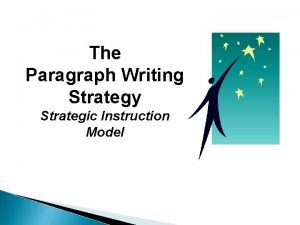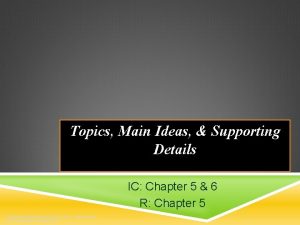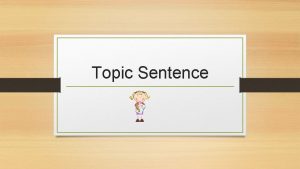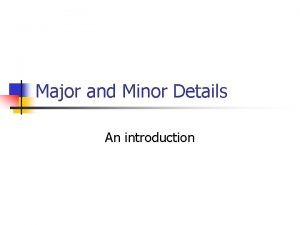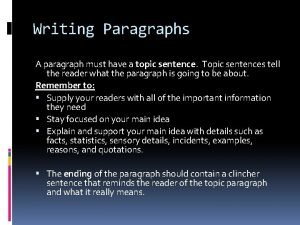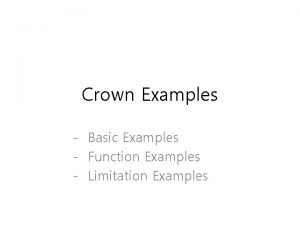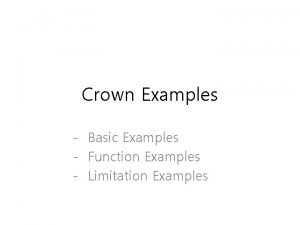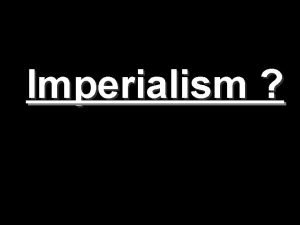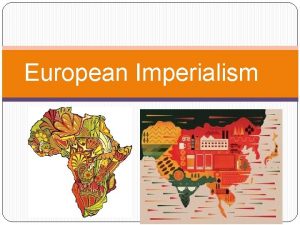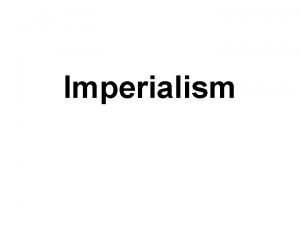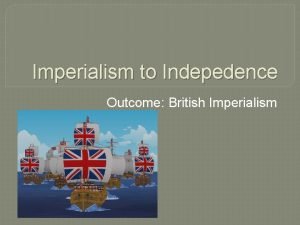Specific Examples of Imperialism Topic Details of specific


















- Slides: 18

Specific Examples of Imperialism Topic: Details of specific global imperialism-related events Objective: Students will analyze the events that occurred during or as a result of Imperialism in the 19 th Century (1800 s), and evaluate how the events connect to Imperialism. Essential Question: Was the Age of Imperialism positive or negative for the world as a whole? Explain

Sepoy Rebellion 1857 Who were the Sepoy? – In India, Britain paid, trained, and armed Indian people to work for and protect the British trading posts in India The Sepoy was the main fighting force that the British had in India, even though they weren’t British

Sepoy Rebellion - Parts of Sepoy religion The Sepoy were almost all either Hindu or Muslim Hindus believe that cows are sacred, they should never be killed or eaten Muslims believe that pigs are forbidden to eat In 1835, these soldiers were given a new rifle to use called the Enfield Rifle. This rifle was very accurate and advanced for its time

Sepoy Rebellion - How did this cause Rebellion? But there was one major problem – FAT Bullet casings greased with Cow or Pig Fat Rebellion! The Sepoy rebelled against the British Sepoy were crushed. This was good and bad for the Indians: It led to more intense, direct British control. But it also led to Indian people thinking of themselves for the first time, as an India united for the same cause (Nationalism)


Opium War– Who was Involved? Before the 1800’s, China was possibly the strongest empire in the world. They refused to accept most trade with Europe because they felt like they didn’t need it. As Britain industrialized, they needed so much wealth to support their advance that they started growing Opium in India (colony) and selling it in China during the Qing Dynasty

Opium War – How did it Happen Shocker – The Chinese tried to prevent illegal drug trade in their country The British felt threatened by this, they did not want to lose out on the massive wealth they were getting In 1839 the British sent advanced gunboats, artillery, and well trained riflemen to China – Start of the Opium War The Chinese army was horribly obsolete (out of date), and were quickly forced to give Britain whatever they wanted.

Opium War – Results Treaty of Nanking Britain got 21 million ounces of silver, got control of Hong Kong, and could now trade in more cities in China. Britain also got extraterritoriality and “Most-Favored Nation Status” from China remained bitter about this and refused to accept the benefits of European technology and trade

Boxer Rebellion – Who was Involved? 1900 – Britain, the United States and other European powers have decided on their own that China should be open to all outsiders for trade and travel. Although this made Europeans happy, many people in China detested the ever-increasing invasion into their land.


Boxer Rebellion – How did it Start? A secret group known as the “Harmonious Fists” were known for their exercise through shadow boxing – boxing without an actual opponent. They believed their swift movements learned in this training would prevent bullets from hitting them (yea. . ) They were especially upset at the intrusion of foreigners into China. Their motto was “Destroy the foreigners. ” The Boxers would travel through the countryside, murdering any Europeans that they encountered. This was given the name Boxer Rebellion.

Boxer Rebellion - Results Obviously, this concerned the European and US governments. 20, 000+ troops made up of British, French, German, Russian, American and Japanese armies swiftly entered China under the Qing and destroyed ended the slaughter. Payments for the troubles caused were forced upon China. In 1911, 11 years later, this and other issues would cause the Qing Dynasty to fall.

China and European Influence by 1914

Meiji Reforms – Who was Involved? From the 1600’s to the 1800’s, Japan was controlled by the Tokugawa Shogunate. Just like China, they distrusted and disliked foreigners. Just like in China, Europe and the United States wanted more access to trade in Japan. The United States was the country that ended up being successful in coming to an “arrangement with Japan.


Meiji Restoration - What was it? 1853 – USA sends four powerful warships to Japan to “encourage” them to be more open to the rest of the world – both in trade and in travel. More advanced warships returned that same year, “convincing” Japan to sign a treaty that would allow opening of trade, return of any sailors shipwrecked safely, and permanent residency for a small group of Americans in Japan This treaty was called the Treaty of Kanagawa Unlike the Chinese who totally resisted European influence, the Japanese embraced change, realizing that if they did not, they would only

Meiji Reforms - Results EVERYTHING in Japan changed Modeled government after US gov’t – voting, 3 branches of government Rapidly industrialized – railroads, factories, shipbuilding Acceptance of modern weapons and modern military strategy Change to American model of education – elementary and secondary schools, and universities More rights for women Japan made so many changes, so quickly, that they actually became an Imperial Nation themselves. They went on invade and take land

 Specific topic examples
Specific topic examples Narrow topic examples
Narrow topic examples Causes of new imperialism
Causes of new imperialism Old imperialism examples
Old imperialism examples Major and minor supporting details
Major and minor supporting details Details example
Details example Main idea and supporting details definition
Main idea and supporting details definition What is topic sentence example
What is topic sentence example Example of topic
Example of topic Supporting sentence
Supporting sentence Paragraphn
Paragraphn Specific details for effect
Specific details for effect Example of specific details
Example of specific details Major and minor supporting sentences adalah
Major and minor supporting sentences adalah Example of major point
Example of major point 11-sentence paragraph examples
11-sentence paragraph examples Research question
Research question Main idea
Main idea Cubing can help you gather details about a topic by
Cubing can help you gather details about a topic by
